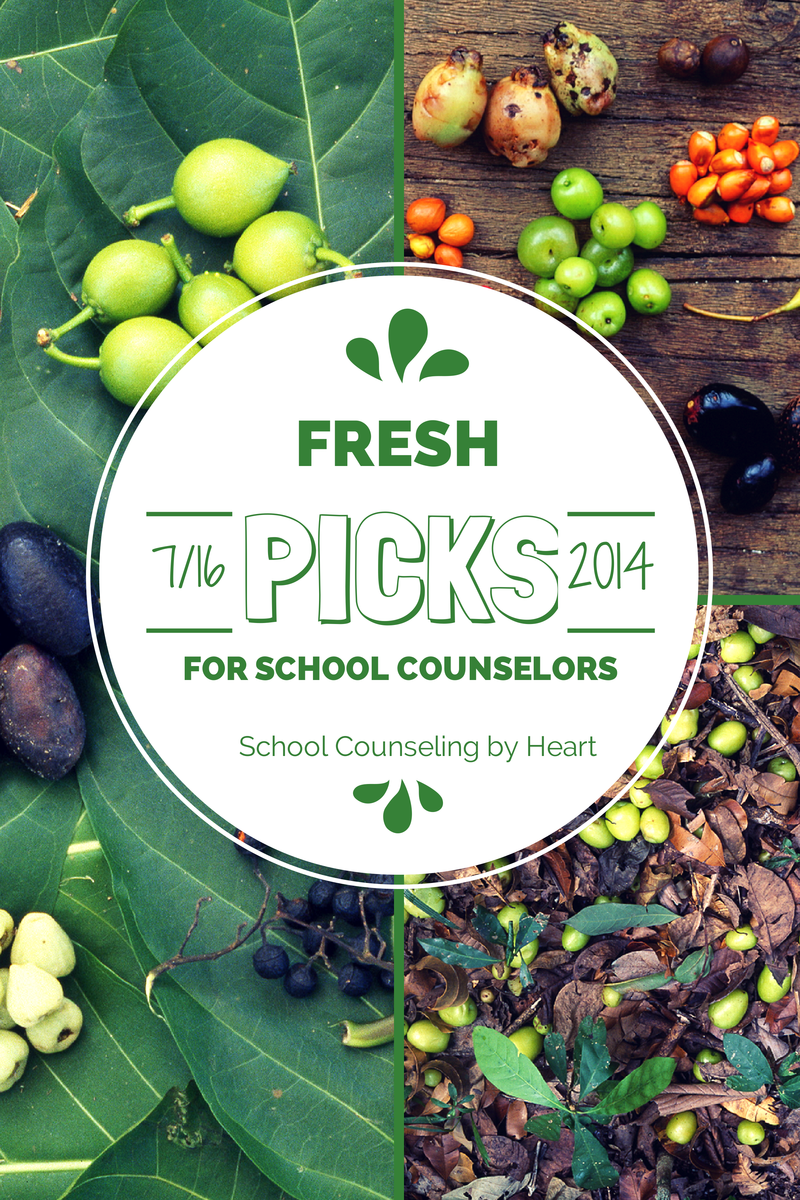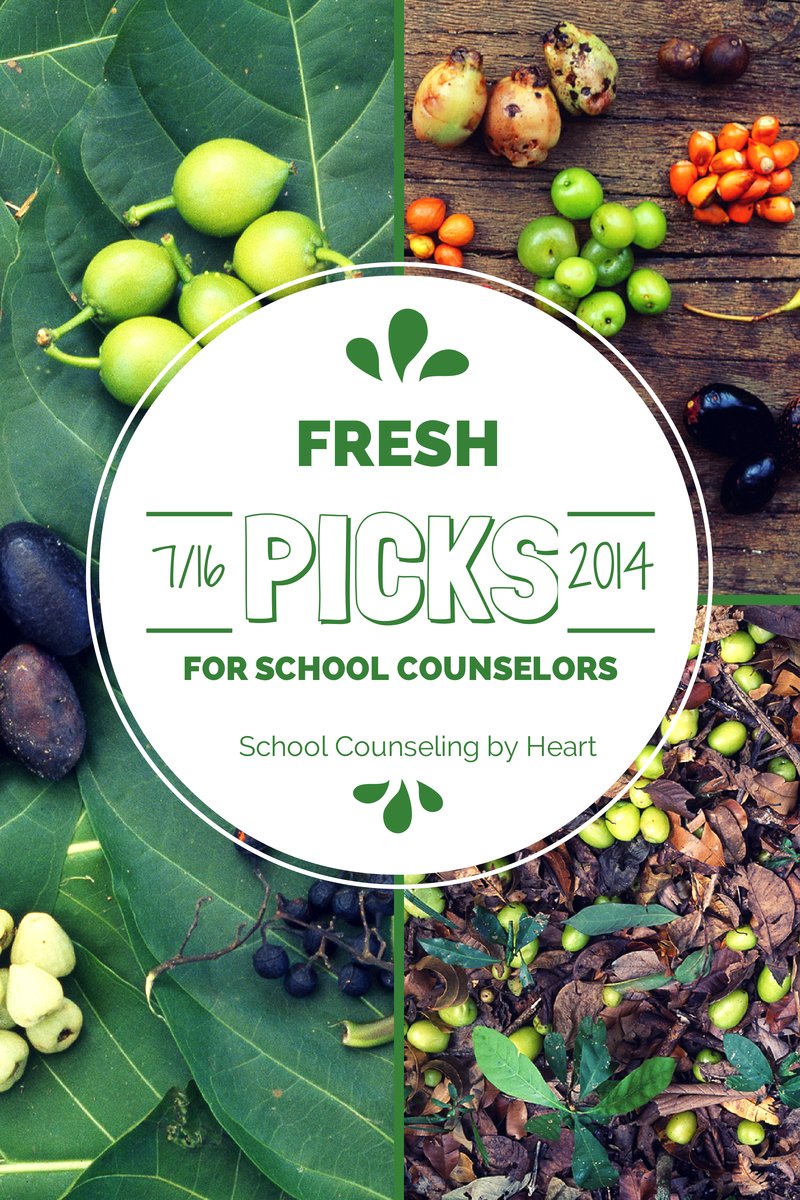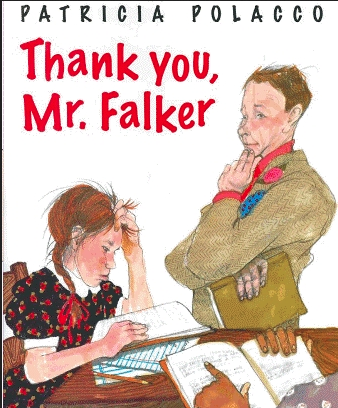 I find great resources all the time, things I use right away or plan to soon, but often don’t have time to blog about them. So I’ve decided to go ahead and share them here in a regular series called Fresh Picks for School Counselors. (Oh how I’d love to say weekly series, but, well, you know . . .) They may turn up again in a later blog post when I’ve incorporated them into a lesson, activity, or have done some serious thinking about them, but until then (if there is a then), here they are as is. I’d love to hear how you use them! I hope you enjoy the first harvest!
I find great resources all the time, things I use right away or plan to soon, but often don’t have time to blog about them. So I’ve decided to go ahead and share them here in a regular series called Fresh Picks for School Counselors. (Oh how I’d love to say weekly series, but, well, you know . . .) They may turn up again in a later blog post when I’ve incorporated them into a lesson, activity, or have done some serious thinking about them, but until then (if there is a then), here they are as is. I’d love to hear how you use them! I hope you enjoy the first harvest!
Classroom or Small Group Activity: Grit Curriculum Lesson: Setting S.M.A.R.T. Goals
As school counselors and educators, we use S.M.A.R.T. goals all the time. Here’s an example of how to help students develop perseverance by teaching them how to use and evaluate their own S.M.A.R.T. goals. (It’s also a great reminder for adults who need some clarification about S.M.A.R.T. goals.) The video and accompanying lesson plan from Edutopia show how you can recreate this lesson for students in upper elementary and above.
Information to Share: How Childhood Trauma Could Be Mistaken for A.D.H.D.
An all-too-frequent issue: Students coping with trauma may have difficulty concentrating, act impulsively, become agitated, or engage in high-risk behavior, all symptoms which can also indicate A.D.H.D. But responding to behavior as if it is a function of A.D.H.D. when in fact it is a result of trauma (or vice versa) can make matters worse. Sharing this article from The Atlantic is a great way to help colleagues, team members and parents think more carefully about what could be at the root of student behavior. It could also help you formulate questions to ask when meeting with a parent or working with a team on behalf of a student who is struggling with behavior that gets in the way of her/his learning.
Inspiring (And Catchy) Career Song: Change the World Oh what is not to love about muppets? This music video, great for introducing a career lesson, features some mop-haired, bright-eyed friends singing “I’m gonna change the world. Nothing’s gonna stop me, nothing’s gonna get in my way, I’m gonna make a difference, gonna start today!” It is really fun, and is totally stuck in my head! The lead singer, trying out the roles of doctor, judge, astronaut, and president, sings, “I can be anything I want to be!” Watch this Sesame Street music video and have yourself a fun little one-and-a-half-minute dance party! Even if you don’t work with little ones, you might just want to use it!
Food for Thought: Counseling is Not a Search Engine
Tabitha from Scrapbook of a School Counselor holds a special place in the school counselor blogging world. She is a deep thinker, and is always honest and open about her process of self-reflection as she considers her work as a school counselor. She is brave enough to show the vulnerability that we all experience, but are sometimes afraid to admit. Quite simply, she is a wonderful role model who always prods my thinking and personal reflection. In “Counseling is Not a Search Engine,” she shares how important it is to find balance between being engaged in the school counseling online world and our face-to-face work and personal lives, think carefully about the resources we collect, let go of comparisons to others, and be fully present. It is a must-read!
Address Common Core Standards: Digging Deeper: Developing Comprehension Using Thank You, Mr. Falker
Thank You, Mr. Falker by Patricia Polacco, which tells the story of a girl who struggles to learn how to read and the teacher who believes in her, is a great book to use in classroom, small group, or individual settings. Perhaps you already use it. But here’s something new: resources to help you address Common Core standards when using the book, including strategies for helping reading comprehension. Even though we are not reading teachers, it is not such a stretch for us to work on reading comprehension, because we want students to show empathy for characters, relate aspects of a story to their own experiences, and comprehend the issues in books we share with them. Besides, anything we do that helps students become stronger learners not only helps them; it also strengthens our counseling programs and helps stakeholders recognize the value of what we do. This lesson plan from ReadWriteThink, suitable for K-4, includes preparation details, a step-by-step instructional plan, printouts, and related links.
Just for Fun: Never Fear, If You Suffer From PADS, Help Is On the Way!
You may have noticed that people who attended #ASCA14 and even those who were #notatASCA14 felt recharged and energized by being with others who share their passion for school counseling. There’s bound to be a let-down after leaving such a positive and collaborative environment, especially when you realize that it won’t happen again. Never fear, Jeff from The Counseling Geek has a cure for the malady he has named PADS – Post ASCA Depression Syndrome, and here it is, in this hilarious video. Enjoy!
You might also be interested in . . .
A is For #ASCA14, and Also For Advocacy
Finding a School Counseling Job



